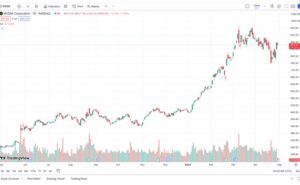Illegitimi non carborundum. This World War II–era saying, mock Latin for “Don’t let the bastards grind you down,” seems appropriate as the world struggles against an invisible virus.
We aren’t engaged in a traditional global war, but we are fighting an enemy that will sicken and possibly kill anyone it meets without discrimination. Many people are struggling to stay strong as each day brings forth new challenges and even some victories, like the U.S. government approving a $2 trillion relief package to help the world’s largest economy confront the coronavirus.
If we learned anything from the financial crisis of 2008-09, the aftermath of the 9/11 terrorist attacks, and all of history’s nasty episodes, it is that extreme personal discomfort usually marks incredible buying opportunities for stocks. If you can pay your bills and attend to the needs of your family, consider averaging down the cost of your portfolio or selectively adding blue-chip stocks with the power to reliably pay dividends.
In general, the options market is a mishmash of anticipation amid heightened volatility. Some investors are buying downside put options on indexes and stocks that would prove profitable if the market collapses. Those trades seem ominous, but they are mostly predicated on volatility increasing sometime in the future, which would probably increase the value of those puts.
Other investors are selling expensive puts and calls on stocks that they own, or want to own, and trying to take advantage of elevated volatility.
Market quality is horrible. Spreads are outrageously wide. Liquidity is strained. Trade only with limit orders and try to execute orders at different prices.
Market scuttlebutt is in overdrive. Some funds have already imploded, and managers talk about banks essentially shuttering funds that do business with them, thus enabling the bank’s traders to take over positions at favorable rates. It’s hard to know how much of this is true, but it is indisputable that the markets are increasingly feral, however it appears on the surface.
While it’s important to have some sense of inner-market dynamics, stock selection is paramount. Consider BlackRock (ticker: BLK), a company we have recommended for years as one of the best ways to monetize the rise of passive investing, risk management, and the use of sophisticated technology to optimize investment decisions.
Earlier in the week, BlackRock, the world’s largest asset-management firm, was tapped by the U.S. government to help manage the Federal Reserve’s debt-buying programs that were initiated to deal with the economic fallout from the coronavirus.
In mid-February, the stock was trading around $581. Shares fell sharply with the rest of the market to about $324 on March 18, and have since rebounded.
Investors who are intrigued by BlackRock can consider using a “half and half” strategy: buying half as much stock as you would like to own and selling an equivalent number of puts to potentially buy the stock at an even lower price. Rather than buying 1,000 shares of BlackRock, for example, buy 500 and sell five downside puts.
With the stock around $401.50, an investor could sell five BlackRock July $380 puts for about $44 per contract. The put sale positions investors to buy the stock about 5% lower.
If the stock is above the put strike price at expiration, investors keep the put premium. Should the stock be below the strike price at expiration, investors must cover the put or buy the stock at the strike price. The key risk is that the stock falls far below the put strike price. Of course, the effective purchase price of the stock would be $336 (strike less premium received), which provides a modicum of safety.
Don’t consider this trade if you can’t warehouse the stock for a few years. These difficulties will pass, but we may be challenged again by the coronavirus. Be disciplined, be strong, and manage your risk.
—
Originally Posted on March 26, 2020 – Picking Up Stocks on the Cheap Amid the Turmoil
Disclosure: Interactive Brokers
Information posted on IBKR Campus that is provided by third-parties does NOT constitute a recommendation that you should contract for the services of that third party. Third-party participants who contribute to IBKR Campus are independent of Interactive Brokers and Interactive Brokers does not make any representations or warranties concerning the services offered, their past or future performance, or the accuracy of the information provided by the third party. Past performance is no guarantee of future results.
This material is from Barron's and is being posted with its permission. The views expressed in this material are solely those of the author and/or Barron's and Interactive Brokers is not endorsing or recommending any investment or trading discussed in the material. This material is not and should not be construed as an offer to buy or sell any security. It should not be construed as research or investment advice or a recommendation to buy, sell or hold any security or commodity. This material does not and is not intended to take into account the particular financial conditions, investment objectives or requirements of individual customers. Before acting on this material, you should consider whether it is suitable for your particular circumstances and, as necessary, seek professional advice.
Disclosure: Options Trading
Options involve risk and are not suitable for all investors. Multiple leg strategies, including spreads, will incur multiple commission charges. For more information read the "Characteristics and Risks of Standardized Options" also known as the options disclosure document (ODD) or visit ibkr.com/occ

























